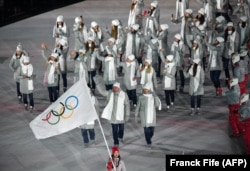The World Anti-Doping Agency (WADA) announced that Russia met the October 9 deadline for responding to questions regarding “inconsistencies” in the data WADA investigators retrieved from a Moscow laboratory in January as part of a massive doping investigation.
The agency said its Intelligence and Investigations Team and independent forensic experts will analyze Russia’s response, adding that “no fixed timeline can be set for this” but that WADA is pursuing the matter “robustly and as quickly as practicable.”
The timeframe reference is specifically important for Russia. If WADA finds Moscow’s response to its inquiry insufficient or that Russia intentionally forged the data before granting the WADA investigators access to the Moscow lab’s computers and servers, the penalties for Russian sports could be severe, including a ban on Russia’s National Olympic and Paralympic Committees.
Yuri Ganus, the CEO of RUSADA, Russia’s anti-doping agency, said this situation puts the nation’s sports on the verge of an “abyss.” In an unprecedented move, Ganus published an open letter calling Russia’s response to the data manipulation inquiry “lies and propaganda,” saying his agency had nothing to do with the alleged data forgery.
“An avalanche of lies grows daily, which is used to hide the true reasons of the anti-doping campaign failure,” Ganus wrote. “… [T]he media space of Russian sports is gradually filled with lies about the situation with database changes, covering those, who brought our sport out to the doping crisis standstill. What opinion can be formed when the media space is filled with materials, which are obviously sponsored? Is there nothing else to answer WADA on Moscow laboratory database distortions? So let's fill the space with appropriate false content of loyal media?”
In an interview with the Izvestia daily, Ganus said the discrepancies in the data discovered by WADA could not be accidental.
“The amount of data that was transferred by the Russian side to WADA representatives in January cannot be changed with one random click,” Ganus said.
That claim is likely true.
While WADA did not fully detail the data its investigators retrieved from Moscow, bits of information from the agency’s reports show that Ganus was correct in saying the data breach could not have been accidental.
In a July 2 progress report on its Russia investigation, WADA said its intelligence had identified a “target pool” of 298 athletes representing 578 samples with the most suspicious data. It also said WADA’s Intelligence and Investigations Team had provided an estimated 500 gigabytes of data from the Moscow laboratory to the International Association of Athletics Federations’ Athletic Integrity Unit. It was in this report that WADA first disclosed its problems with the Russian data.
“While much has been achieved since the data and samples were retrieved, a lot of highly technical and protracted work remains in collaboration with leading experts in digital forensics. This includes examining some differences identified between the LIMS database provided by a whistleblower in October 2017 and the version WADA I&I removed from the laboratory in January 2019, and any impact that these may have on bringing cases forward,” the report stated.
In a September 23 progress report, WADA said its investigators had identified only 47 cases that were “unaffected and contained no inconsistencies in the data.”
The whistleblower database WADA referred to led to what has become known as the McLaren Report, concerning allegations and evidence of state-sponsored doping in Russia, after which an investigation was launched into “institutionalized manipulation of the doping control process” in Russian sports.
While the Russian sports authorities continue to deny any wrongdoing, Ganus’s criticism has been sympathetically received by some in the Russian media.
The famous Russian TV journalist and commentator Vladimir Posner said he was very concerned by the situation.
“Does it bother you that in the event the fraudulent activity is confirmed, the whole world will point a finger at Russia and say that we are deceivers and cannot be trusted? And this, of course, will apply not only to sports. It worries me very much!” Posner wrote on Instagram.








